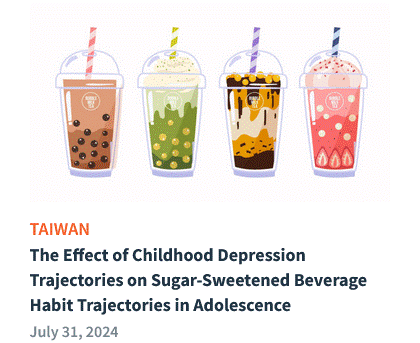
臺大公衛學院為加強宣導本院教師之學術成果,進而提升本院國際能見度,由張齡伊老師之撰寫下列文章投稿至ASPPH Friday Letter.
The effect of childhood depression trajectories on sugar-sweetened beverage habit trajectories in adolescence: Exploring sleep problems as a mediator
該文目前已刊登於ASPPH Friday Letter, Auguest 2, 2024
作者:
Chun-Ji Lin, Ling-Yin Chang (本所教師張齡尹副教授及通訊作者), Chi-Chen Wu, Hsing-Yi Chang
期刊名稱:Appetite
發表日期:2024.03.01
發表文章:

摘要/Abstract
Although depression has been linked to the habit of consuming sugar-sweetened beverages (SSBs), little is known about their long-term relationships and the mediating role of sleep problems. This study examines the associations between childhood depressive symptoms trajectories and adolescent SSB-habit trajectories and whether sleep problems mediated these associations. Data came from 1560 adolescents participating in a longitudinal study across grades 1 through 12 in northern Taiwan. Group-based trajectory modeling was used to identify development of childhood depressive symptoms and an SSB habit in adolescence. Multinomial logistic regression was conducted to examine the influence of childhood depressive symptoms and adolescent SSB habit. Mediation analysis was conducted to test whether sleep problems mediated the associations examined. Four distinct trajectories of childhood depressive symptoms were identified: low-stable (30.79%), moderate-stable (42.32%), increasing (12.29%), and high-stable (11.60%). Three distinct trajectories of SSB habit in adolescence were identified: low-stable (44.32%), increasing (15.02%), and high-stable (40.65%). Children who had moderate-stable (aOR = 1.35; CI: 1.04–1.77), high-stable (aOR = 2.01; CI: 1.28–3.15), or increasing (aOR = 1.97; CI: 1.26–3.06) trajectories of depressive symptoms relative to those in the low-stable group were significantly more likely to belong to the high-stable trajectory of SSBs than to the low-stable SSBs group. The Z-mediation test showed that sleep problems significantly mediated the associations between trajectories of childhood depressive symptoms and trajectories of SSBs during adolescence (all p < 0.05). Childhood depressive symptoms conferred risks for adolescent SSB habits; and the effects were seen, in part, through increasing sleep problems.
關鍵字/Keyword
